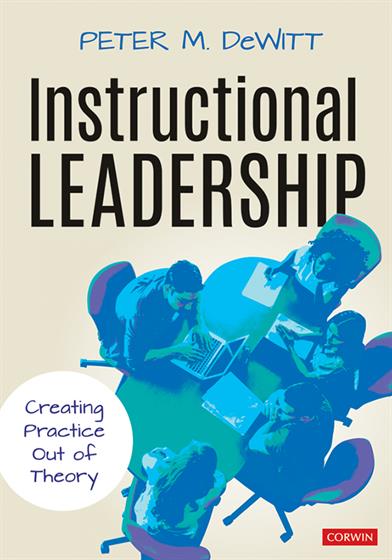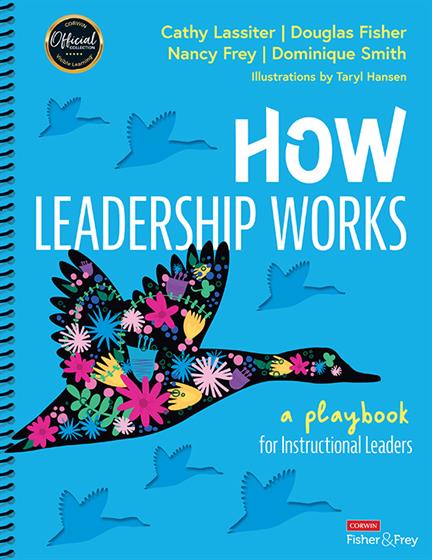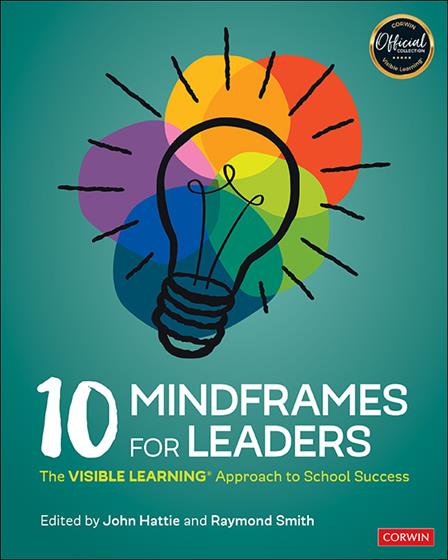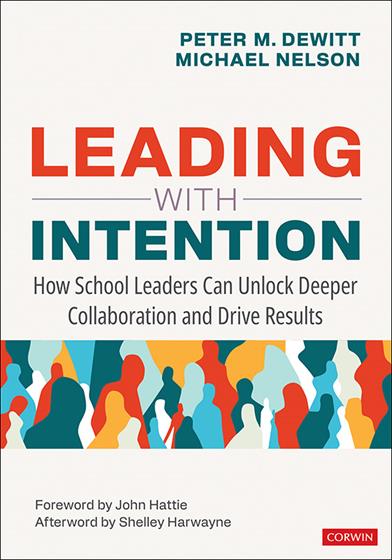
Intentional Leadership
Date: 09/16/2024
Run time: 34:22
Season 8, Episode 1
In this special-format episode, our co-hosts Peter DeWitt and Michael Nelson explain and set the theme for the exciting new season of the Leaders Coaching Leaders podcast with a lively discussion and interview of each other! Hear their deeply personal stories about what set them on the path to education leadership and to leading with intention. They’ll reveal their approach to their mission and their deeply felt learning mindset – and how they’ve been shaped and affected by the collaborative, mutual learning they experience every day with the many dedicated educators they feel so fortunate to work with.
Listen, review and subscribe on: Apple, Spotify, YouTube,
Episode Audio
[00:00:00.60] ANNOUNCER: Welcome to Corwin's Leaders Coaching Leaders
podcast, with hosts Peter Dewitt and Michael Nelson. This podcast is from
education leaders for education leaders. Every week, Peter, Mike, and our
guests get together to share ideas, put research into practice, and ensure that
every student is learning not by chance but by design.
[00:00:25.98] PETER DEWITT: All right, Michael Nelson, welcome to the
Leaders Coaching Leaders podcast.
[00:00:29.56] MICHAEL NELSON: Peter Dewitt, welcome to Leaders Coaching
Leaders podcast.
[00:00:32.83] PETER DEWITT: We've decided that, the first episode, we're
going to interview each other. And that doesn't feel odd at all.
[00:00:40.16] MICHAEL NELSON: No, not at all.
[00:00:41.10] PETER DEWITT: Not at all. But here we are. We're in Melbourne,
Australia, as we're recording this. We've been facilitating workshops here.
We're going to be going to Sydney and Perth. We were in Canada about a week and
a half ago. This is a pretty new experience for you because you had been a
superintendent, and then you were at WASA, the Washington Association of School
Administrators, where you put on a lot of conferences. You created the
Instructional Leadership Network, all of these things. But now you are the
facilitator and author. How is this feeling?
[00:01:11.28] MICHAEL NELSON: I would say the word "surreal" is
how it feels right now. But, you know, what I can tell you, Peter, is that the
book, our new book, Leading with Intention, really has come alive during this
time of travel and time of meeting people from all across the world. And what I
mean by that is we focus on human interconnectedness in our book. And we talk a
lot about authenticity and realness.
[00:01:41.73] And in the book, we highlight Guy Winch's research on
genuineness. And that has really resonated with our participants from many
countries and across the United States in the last two or three months as we've
been doing lots of traveling and lots of workshops. And what I can say is,
having gone through the system from teacher to principal to district curriculum
director and then superintendent and then into the state-level work in
Washington State, this broadening of experience and meeting educators from all
around the world, there's a united message that there's a lot of individuals
who chose to go into the field of education that really care and that are
genuinely doing all they can to support students.
[00:02:33.78] And I don't know how you and I can spread that message, but
that's a message that I would love to share much more globally of this we are
not silos of grade levels or silos of countries. We're united around supporting
students. And that feels good. And for me-- and I know we wrote the chapter
before we did this travel. But for me, chapter 2 of the book, which is
"Human Interconnectedness," has really come alive.
[00:03:04.76] PETER DEWITT: I think-- one of the things that I think about
when you're actually talking about that is the audiences that-- the educators
we've been able to work with, I feel like they genuinely want to be there.
[00:03:18.43] MICHAEL NELSON: There you go. You're using the word
"genuine."
[00:03:20.10] PETER DEWITT: Yeah. No. They need to understand why they're
there because they don't always know why they're in the room. But I feel like,
when we start, they genuinely want to be there. And here's the thing that I
think is-- I guess a question that I want to ask about. When we're talking
about things like leading with intention, we're also focusing on what we've
referred to often-- and it's been referred before us-- to the learner's
mindset. We're in Melbourne. We're going to be in Sydney and Perth. We're in
Canada. We're in the US, whatever. But we have a learner's mindset.
[00:03:57.90] When we're going into these facilitating of workshops, we are
not going in feeling like we're the experts. We're going in asking questions
because many of the people that are in the room understand their context,
obviously, better than we do. So for you and me, I feel like facilitating the
workshops or even leading with intention in general is about going in with that
learner's mindset to ask questions that you're deeply interested in. But at the
same time, you're feeling like you're developing the expertise together within
the room. Does that make sense? Is that-- does that feel to you like what we're
trying to do too?
[00:04:42.04] MICHAEL NELSON: It does. And that goes back to the genuine
statement. And what I feel, how I might answer, or how I might share a little
bit of information around that subject is you and I have had pretty incredible
experiences. You and I have been blessed as educators. And when you are
blessed-- I feel like my little bit of my faith, maybe, was coming out. When
you're blessed, you have almost this obligation to share and to spread some of
that wealth that you've been given.
[00:05:16.48] And we have been blessed in our careers and have had different
experiences. And so when we engage with our participants and our people that
come to our workshops, we share a little bit from our experiences, not from you
need to do it this way, from the perspective-- here's some experiences. And
then, like you said, we generate questions. We move into protocols of, how
might we engage and make it better?
[00:05:44.93] And I love-- we have interviewed in the season that our
viewers are going to experience. We've already done some of the podcasts, and
you're going to hear a common thread of the word "student" and a
common thread of the word "learning" and "learner" over and
over and over again. And I think, through our experiences and how we design the
workshops and the blessings that we've been given, it moves the participants
forward. And so there's this immediate appeal to the head and the heart. And
very quickly-- I don't know about you, but I feel like our participants quickly
become really good friends and colleagues right away.
[00:06:29.83] PETER DEWITT: Yeah. I mean, I feel like that connection is
really important when it happens. You're right about the blessed part. When I
became a teacher-- I mean, my family talked about it like I was just-- it was
the most amazing experience that I was able to be a teacher for 11 years. We
talk so much about-- and one of the worldwide issues we're focusing on that
comes up everywhere is teacher attrition. People are leaving the profession.
[00:07:00.84] That kind of baffles my mind just because of the fact that,
when I was a teacher for 11 years, I felt very fortunate to be a teacher. And I
learned so much that I didn't necessarily get in the pre-service teaching
program. I certainly got it from the cooperating teachers that I had. So I felt
very blessed, to use your word, to do that. And then when I became a teacher, I
had a special ed teacher that I was working with, a speech pathologist. We
learned together, and I felt like I learned from them. Every day was kind of
this master class.
[00:07:34.16] I don't know if everybody's getting that experience. So when
we're talking about-- one of the big issues that comes up quite a bit, as well,
besides teacher attrition, is that of Tier 1 instruction. And I felt like I was
exposed to Tier 1 instruction all the time, both as a student teacher but also
in my role as a teacher. And I learned it from co-teaching with special ed
teacher.
[00:07:59.13] I don't feel like everybody gets that experience. How is it
that we are at the age that we are and we're not disgruntled by being in
education? We actually feel grateful to be in education. And I get it. Some
people will say, well, Peter, you did leave. No, I didn't. I went from teaching
for 11 years to being a principal for 8 years, still in lots of schools, still
doing a lot of coaching. But education itself, I feel very blessed to have been
an educator.
[00:08:32.68] How is it that you keep that going? Because I think that's a
really important-- I know we weren't prepared to ask each other this question,
but it came up in a conversation. What would you say to people who are in
education that don't always feel so blessed? How do you maintain that? Because
you really do. If people know you, you really-- whether you're a teacher or a
building leader, a district leader, you were a superintendent for 14 years,
which these days is unheard of, how have you kept that gratitude?
[00:09:06.55] MICHAEL NELSON: I feel like, for our audience, I want to turn
the table on this one.
[00:09:10.81] PETER DEWITT: But you're going to answer my question first.
[00:09:13.06] MICHAEL NELSON: OK.
[00:09:13.45] PETER DEWITT: Because you're not going to turn the table.
[00:09:15.14] MICHAEL NELSON: OK. But I'm going to turn the table after I
answer the question. So I think it goes back to that learner's mindset of--
John, in the last episode of our last season, talked about it wasn't until the
2000 or the early 2000 that we, as educators, can have taken upon ourselves to
investigate and study research ourselves-- that before that time, it was would
do your programs. And once you were done with your program, you felt like you
were done.
[00:09:51.91] But we wouldn't necessarily-- educators before that time
wouldn't necessarily chew into or get really deep into that research piece. And
John says, after that--
[00:10:03.12] PETER DEWITT: Paddy, you were talking about. I just want to be
clear.
[00:10:05.47] MICHAEL NELSON: My friend, John.
[00:10:06.48] PETER DEWITT: Yeah, exactly.
[00:10:08.34] MICHAEL NELSON: It really talked about that as a huge shift,
and that he believes, in the future, we will recognize that as a shift. And
over time, culturally, that will fundamentally change who we are. Because I
don't think there's teachers, principals, superintendents, educational leaders
that aren't constantly and continually reading research. And I think that
begins to-- that fills me. That fills me when-- And when I read about the great
work of others, and how they have made huge gains. And I want to study that,
and want to ask questions-- and that I become inquisitive myself. That is
intriguing to me.
[00:10:51.73] But my flip, I'll say--
[00:10:54.07] PETER DEWITT: Here we go.
[00:10:54.40] MICHAEL NELSON: But my flip on that is you talk about, and
John talked about that research. You had a pivotal moment in your life. You
weren't necessarily a learner. And there seemed to be-- and I don't know, if
our audience, if they truly have heard your story about there was a pivotal
moment when you became-- moved from Peter DeWitt, a nice guy, but not
necessarily a high-performing student, to Peter DeWitt, I'm a learner, and I'm
going to take on learning for the rest of my life.
[00:11:27.32] PETER DEWITT: You're being very kind. There was-- And I think
that it was a pivotal moment. That's a really interesting way to say it, too,
because I think as soon as it clicked, I just kept going. I was retained in
fourth grade, and then my dad died when I was in fifth, and my mom went back to
get her GED when I was in sixth grade. And I remember always feeling older
because I was. People knew when your birthday was, and then people would say
how-- kids in class would ask you how old you were, and you told them.
[00:12:02.30] And you're like-- they, as kids, looking at you saying, well,
why are you a year older than me? And you have to say, well-- and back then, we
would just be pretty blunt-- I failed fourth grade. That's what we said. When I
got to the point where-- you know, I was a runner my junior, senior year of
high school. And then my coaches just kept saying, come on, DeWitt. You've got
to graduate from high school. That's how low the bar was. I mean, it really
was. I graduated with a 66% average, and 65% was passing, and I was fourth from
last in my class.
[00:12:39.91] I went to community college thinking I was going to change
things, but I was only going because my friends were going. And then I went to
another community college. My sister, Trish, was working there. And then I
dropped out of that one. And then I was really in this position of-- I was at
that crossroads, which sounds pretty cliché, but I was. And I really had the
choice of, am I going to go work somewhere where I was growing up with a high
school diploma? Which is fine if that's what people want to do. Or do. I need
to give school one last chance?
[00:13:16.82] And my sister, Trish-- who was National Honor Society, but she
dropped out of college to help take care of me because she graduated a couple
of months after my dad died-- she just said, I need you to get a two-year
degree. So when I went to Hudson Valley Community College, my coach said,
you're not going to be a professional runner. You need to go into the Learning
Assistance Center.
[00:13:37.66] And I think I was ready. I know we met with my friend Annie
last night in Melbourne, and I've known Annie since I was about 22, when I was
actually a student at the community college. But even then, I still felt older
because I was 22, and I was at a community college. That's when most kids are
graduating from college. And I was starting. And I went from a 1.7 GPA to a
3.6.
[00:14:02.86] As soon as I started to get that level of success, it's like
self-efficacy. As soon as I built that confidence, I didn't want to let it go.
Like, I got an A for the first time, and it just kept going. And I think that
I've kept-- I've held on to that since I went in to be an elementary school
teacher. I loved being an elementary school teacher. I ended up going back to
get my degree in administration. I had a master's in ed psych thinking I was
done with school, and that was 1999-- so right around where John was talking.
[00:14:34.76] And then I ended up going back, and I was an adjunct at the
school where I was actually getting my administration degree at the same time
that I was teaching during the day. That was an amazing experience. I remember
looking back at that. I felt so fortunate. But every time, I also had that
family support. You know what I mean? Like my mom, my sister, they were always
so very supportive of everything that I was doing. So that sense of pride was
important, as well.
[00:15:03.21] But I worked with people who were teachers, and their parents
didn't treat them the same way. It was, don't you want to be more than a
teacher? And it's like, you and I had opposite experiences growing up in the
way that you had both your parents. You were a really good student. But a
similar experience that you and I had is that your mom always said that
education was the noblest of professions.
[00:15:33.80] MICHAEL NELSON: Correct.
[00:15:34.15] PETER DEWITT: And my mom didn't say it that way. But as soon
as I became a teacher, everybody she met, she would say, this is Peter. This is
my youngest son, Peter. He's the teacher. So that part, I think that sense of
pride may have actually instilled part of this in, as well. And I think, to
bring it back to the Leading With Intention piece, I wonder if those moments--
those pivotal moments back then-- set us on a different course to just always
make sure that we were giving back to the profession that we were getting so
much from.
[00:16:07.91] And I know that, to some people, that might sound corny. But
it is that servant leadership that Robert Greenleaf always talked about, as
well.
[00:16:15.61] MICHAEL NELSON: I think-- Thank you for sharing the story. I
think that story, in itself, is worth the whole podcast. I fully,
wholeheartedly feel that way. But as I think about your story in terms of the
book-- and I can't help but think about just your self-awareness, and
external-- both internal and external self-awareness, which we talk a lot about
within our book, Leading With Intention.
[00:16:45.28] And I've heard you describe others' feeling of you-- your
perception was, oh, you're a DeWitt. You're not going to perform at high
levels. So it's OK that you're--
[00:16:58.48] PETER DEWITT: You grew up in West Glens Falls. You're like--
all that stuff.
[00:17:01.44] MICHAEL NELSON: And so dive into thought processes of, why
did-- I'm going to say you, but why did we include self-awareness, both
internal and external self-awareness into the book?
[00:17:16.20] PETER DEWITT: I don't know. I think sometimes it happens by
accident. I'd hate to say it that way, but we learn so much by facilitating
workshops. Like, I'm going in-- when I go in coaching, when I go into
facilitating workshops, I'm there to learn. I mean, I need to learn, or else
it's not going to be-- I don't want to be the show.
[00:17:36.41] I had a cooperative teacher a long time ago that said, you're
not the show. They are the show, the students. So that kind of changed my
mindset, too. And so going into those sessions, you're always like, what
questions can I ask that I'm going to actually learn from? As opposed to, I'm
going to ask questions that I already know the answer to, and I'm going to get
through this day.
[00:18:00.61] What I think, for me, led to us having the discussion about
self-awareness is that we were in these workshops, both individually or
together, and a variety of conversations are happening. And there are people
that are in the session who don't know why they're there. I mean, they're going
to-- And we do a hybrid approach, where there's multiple sessions. And you've
got these people coming up like, I don't know why I'm here. That, to me, is
frightening.
[00:18:31.58] And then also the conversations that you have with leaders who
are going to conferences, and they have this literacy issue back at school, and
they're going to a literacy conference. And when you ask them why they're
going, they say the district is telling us we have to. It's like, no, you're--
Wait a second. How do you not have that self-awareness?
[00:18:53.56] MICHAEL NELSON: But don't you feel like, In your pivotable
moment-- take back to yourself of your-- 22-year-old. All of a sudden, you gain
purpose. You gain understanding of why you were there.
[00:19:06.27] PETER DEWITT: I did--
[00:19:07.00] MICHAEL NELSON: And a different sense--
[00:19:08.27] PETER DEWITT: But one of the things that's interesting about
the self-awareness piece, because this comes up-- it just came up yesterday--
came up the day before, when we were running workshops-- is that, yes, I think
it's contextual. Because at that moment, I started to become much more
self-aware internally. And externally, I was getting a greater understanding of
how people felt about me.
[00:19:34.24] But where that cycle is always interesting is that, as soon as
that bug kind of bit me, and I went back to get my second master's, I went back
to get my doctorate-- sometimes you can become so determined and focused,
you're eternally self-aware about why you're doing what you're doing. But
you're not externally self-aware about what that driven purpose is doing to
everybody else. And I think that's where, for me, the role of meditation has
come in, the role of being a coach.
[00:20:11.34] It's finding that balance to be able to say, yes, I'm driven
to go after this problem that we're trying to solve. But at the same time, I
need to back up a little bit and be open to asking questions to understand
externally what's happening. And that's one of the reasons why I enjoy working
with you so much, because you will ask me questions to slow me down that I
don't necessarily always get asked. And then I have to start thinking about,
why am I kind of moving in this direction?
[00:20:47.62] And that's where the leading-- So I think that just all of
that-- that was probably a really huge answer. But the reality is, all of those
conversations, both in workshops, and coaching, and you and I, that has led
me-- that, for me, led me to think more about the internal and external
self-awareness, and where does it intersect with trust. So I want to ask you--
I'm-- because you're flipping this on me. You are really, really good. I just
realized I feel like I should be on a couch and just paying you money at the
end, because--
[00:21:29.09] MICHAEL NELSON: But before you shift, I--
[00:21:31.67] PETER DEWITT: See, you won't even let me do it now.
[00:21:35.21] MICHAEL NELSON: I know we wrote the chapter on self-awareness.
But the more we work and engage as you open the show with, yes, we're in
Melbourne right now, and it's beautiful, and it's an amazing city, and the
educators are incredible, the more we study, and talk, and have conversations
about self-awareness, it can-- and particularly external. I think people
realize self-awareness is internal.
[00:22:01.47] But the external piece, and what that means, and-- it's pretty
deep conversation and could really shift culture within schools and staff
members, and students, as well.
[00:22:15.87] PETER DEWITT: OK--
[00:22:16.65] MICHAEL NELSON: I'll let you go. I'll let you go.
[00:22:18.57] PETER DEWITT: I'm going to flip it out on you now. So in the
book--
[00:22:21.09] MICHAEL NELSON: Here we go.
[00:22:21.84] PETER DEWITT: In the book, we talk about leading with-- or we
talk about self-awareness. We talk about human interconnectedness. And I've
always-- in the books that I've written on my own, I've always had kind of
reflection points, and I've had vignettes, and that kind of thing. But you were
really-- as soon as you started to get used to the process. And-- no, but get
over the--
[00:22:44.55] MICHAEL NELSON: Yes.
[00:22:44.90] PETER DEWITT: --oh my gosh, I'm-- imposter syndrome, writing
this book, and stuff. It was very important for you to not just share your
story, but make sure that the readers had the opportunity to share theirs. Why?
[00:23:00.12] MICHAEL NELSON: There's a phrase that whoever's doing the
talking is doing the learning. And for me, I likened that to a reader. So if
you're reading the book, the author really is doing the talking-- and, in our
case, the authors. And how do we engage with the reader that they are an active
participant and a writer within the book?
[00:23:27.34] And so for us, as we started to talk through this, a couple of
things. One was, having been a principal and superintendent for a pretty long
tenure, always trying to find pieces of information that I could use with staff
and immediately in staff meetings. And so we designed lots of bits of research
that can stand alone, but also interconnect. And so you can imagine protocols,
and-- where you can put the piece of text out with all of your staff members,
or you could put several pieces of text out that really connect.
[00:24:02.57] And so we have that, and we have stories. But there's also the
connection with the author. And some people may look at it and go-- and see the
pauses in the book, and say, oh, it's a workbook. But just as we have said,
human interconnectedness is not relationships. It's much deeper. We believe
it's not a workbook, but it's engaging the reader to become the author. And so
we have coined the term-- if you-- when you-- let's not say if, but when you
pick up our book and you engage in reading with it, you engage as the third
author.
[00:24:42.51] So going through the book, and doing the pauses, and the
reflections, and sharing your own stories, by the end of your time with this
piece of text, you become the third author-- a one of a kind Leading With
Intention book authored by Peter DeWitt, Michael Nelson, and your name, fill in
the blank.
[00:25:02.15] PETER DEWITT: I really like that. And one of the things that
we talked about within the book is collective leader efficacy. So I've explored
that before. But when we were putting-- when we were actually thinking of the
definition, we talked about the fact that it's developing-- when a team, a
leadership team, whether it's at the district or the building, is developing a
shared understanding, and they're engaging in joint work, and they're
evaluating their impact. Because, as you talked about Hattie before, that's
something John has always focused on.
[00:25:32.29] It's not just how we teach. It's what our idea of impact
actually is and looks like. So those are very important questions. So as we're
facilitating workshops, we're taking Leading With Intention. But you had the
idea of, could we just break it down to a really simple part? Because sometimes
it's to researchy. We say collective leader efficacy, and people are like, oh
my gosh. That's just overwhelming. But when we break it down and say, shared
understanding, joint work, evaluating impact, those are really important
pieces. How did you-- as a building leader, as a district leader, how did you
develop a shared understanding? Because I know it's something you do.
[00:26:16.41] MICHAEL NELSON: I'm going to start not where you want me to
start. But--
[00:26:19.50] PETER DEWITT: Of course [INAUDIBLE].
[00:26:22.80] MICHAEL NELSON: --we did break the definition down because we
want there to be shared understanding about the definition of collective leader
efficacy in terms of shared understanding, joint work, impact. But there's a
game that you always-- that there's a phrase that you say after you say the
word. So shared understanding for the purpose of student and staff, learning.
Joint work for the purpose of student and staff, learning. Impact for the
purpose-- I mean, so you can't forget that phrase of the definition. But we've
highlighted those three pieces.
[00:26:59.76] Shared understanding, to me, that is at the core of building a
strong contingency and initiative of all stakeholders to move the work forward.
And as superintendent, I felt a heavy responsibility to do that and to do that
well, and in a variety of ways, because I wanted to set the students up for
ultimate success, as well as the staff. And I usually say students to staff, in
that order, because that's just what is important to me. And so, to answer your
question, I did a lot of writing.
[00:27:49.18] So I wrote to staff every single Sunday night, and I
attended-- you and I share some work by Vivian Robinson. And in terms of being
able-- do you fully not only attend, but participate in the staff development?
And so if I'm in a staff development that Sunday, I'm going to be talking about
that and the impact of that staff development that would have with students and
staff as a result of doing that.
[00:28:15.47] Each and every letter that I've written over the 14 years,
every Sunday, to a staff built that shared understanding. That's just one
simple example that I'll share.
[00:28:26.48] PETER DEWITT: Yeah, and I think one of the things that we're
doing these days-- and we talk about it in the book, as well-- is that we
always send out a pre-engagement letter--
[00:28:33.65] MICHAEL NELSON: We do.
[00:28:34.41] PETER DEWITT: --just to participants. Sometimes we're able to
do when it's even a keynote, but we're able to send out a pre-engagement
letter. We give them our success criteria. We ask them during the session, what
are questions you have based on our success criteria? So we're trying to use
these things to actually help develop that shared understanding. We even have,
in our workshops, Facilitating the Agenda, where we break it down and say, so,
we developed success criteria and asked you to share your questions. How often
do you do that in your meetings?
[00:29:10.16] I often think that we have a common language, but we don't
have a common understanding. Even here in Australia, they're dropping acronyms.
They're these different roles. We could be in the US, the same thing is
happening. We don't often take the time to stop and ask, so I heard you talking
about student engagement. What does that look like in your classroom, or what
does that look like in your school? So the shared understanding part is very
important.
[00:29:34.98] And the joint work is interesting, too, because-- I guess the
term that I've used lately that seems to work is-- and they want us to use it
tomorrow when we're running our next workshop, is-- I've often felt that
collective leader efficacy means when I'm walking into a meeting with one idea,
and I walk out with a better one. Now, that also means we have to focus on the
impact and all of that, too. It's not just the good feeling of, oh, I walked
out with a new idea. It's I walked out with a better idea that I'm going to
use, and I'm going to understand the impact of using it.
[00:30:08.73] So I think those are ways that both-- with Leading With
Intention, but also with the way we're facilitating workshops, we engage in
that joint work. And, let's be honest, I mean, you and I will sometimes
miscommunicate. Actually, in one of our episodes, we have Vivian Robinson, who
said that we don't have a shared understanding. We have a shared
misunderstanding, which I thought was a wonderful thing that she said. But that
joint work is not always easy.
[00:30:38.40] MICHAEL NELSON: Correct.
[00:30:38.96] PETER DEWITT: It takes some clarification to get there. It
takes some-- It takes that relationship piece, that human interconnectedness,
to be able to say we need to get past this misunderstanding and figure out how
to do the work. And that's where teams don't do well, because they get hurt,
and then they go their separate ways, and they get upset. And there's ego
involved and all that stuff.
[00:31:00.48] And for collective leader efficacy, that joint work, to really
happen, we need to try our best to suspend that ego and to know that it doesn't
always have to be about our idea. And if somebody questions what we're asking,
just as long as they do it respectfully, that we can challenge each other's
thinking, and that's OK. Because that's what we do. Behind the scenes, you and
I challenge each other's thinking. And that's OK to be able to do because we
have the relationship to be able to do that.
[00:31:28.72] So what I'd like to end with, because I know we have to wrap
it up pretty soon-- we have a pretty phenomenal season. Now, we are the first
episode. We know that. But it doesn't mean that we necessarily recorded in that
way. So we have interviewed Tom Guskey that I think is just-- interviewing Tom
is always a master class. He's phenomenal to talk to. We've interviewed Zaretta
Hammond.
[00:31:55.35] I mean, you loved the fact that, whenever we asked her
questions, she was focusing on the--
[00:31:59.88] BOTH: Students.
[00:32:01.11] PETER DEWITT: We both had the honor to interview Loren Long,
one of my favorite children's book authors and illustrators. And he is just--
the books that-- his illustrations are great. I mean, even in the podcast
interview, I said I have two of his original prints up on my wall in my office.
And you got a chance to read to him because he asked you to read. I was very
jealous.
[00:32:26.40] Vivian Robinson, we just recently interviewed her because
we're here in Australia. She's in Auckland. And the time difference definitely
worked out really well. We have a pretty awesome season.
[00:32:40.15] MICHAEL NELSON: We do.
[00:32:40.60] PETER DEWITT: That is, I almost feel unworthy that I'm part of
the first episode. I hate to say it that way. But we have a pretty-- yeah, that
was not a good selling point, was it? But we have a pretty phenomenal season.
[00:32:53.23] MICHAEL NELSON: It's a great season, and it's only going to
get better from there. So we have people that we are in contact with beyond the
ones that Peter has mentioned, and we are just excited for this season. And we
just thank you. Really, thank you for tuning in. Thank you for hearing our
story about Leading With Intention and our journey of working together, number
one, but also writing the book and sharing a little bit about behind the scenes
of how did we get to that research.
[00:33:23.71] And even though the book is written, our participants, when we
go out and share, help to change our thinking and help to enrich-- maybe enrich
our thinking is probably a better way of saying it-- enrich our thinking to
make it even better. And so, just as you, as audience members, thank you for
being here. And if, at any point, you have feedback for us, we would love to
hear it.
[00:33:45.69] PETER DEWITT: Well, and I also-- one of the important parts
that you just mentioned, too, besides thanking the audience, of course, is that
we're always learning. So even though we wrote the book, that learner's mindset
is still there because we're never closed down to the learning that we do. And
that's what makes education so exciting. So, Michael, thanks for being a host
on Leaders Coaching Leaders podcast.
[00:34:12.13] MICHAEL NELSON: Always a pleasure to work with you, Peter.
[00:34:14.18] PETER DEWITT: You better say that as we wrap it up.
[00:34:15.98] MICHAEL NELSON: Signing off from Australia.
[00:34:17.60] PETER DEWITT: That's right.
[00:34:18.13] [MUSIC PLAYING]
Episode Video
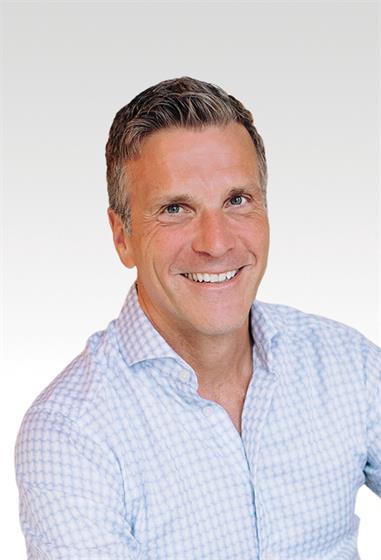
Peter M. DeWitt
Peter DeWitt (Ed.D) is the founder and CEO of the Instructional Leadership Collective, and approaches everything with a learner's mindset. He was a K-5 teacher for 11 years and a principal for 8 years. For over 12 years, he has been facilitating professional learning nationally, and internationally, based on the content of many of his best-selling educational books.
DeWitt's professional learning relationships are a monthly hybrid approach that includes both coaching and the facilitating workshops on instructional leadership and collective efficacy. His work has been adopted at the state level, university level, and he works with numerous school districts, school boards, regional networks, ministries of education around North America, Australia, Europe, Asia, the Middle East and the U.K.
Peter writes the Finding Common Ground column for Education Week with Michael Nelson and they host Corwin’s Leaders Coaching Leaders podcast. In 2020 DeWitt co-created Education Week's A Seat At the Table where he moderates conversations with experts around the topics of race, gender, research, trauma and many other educational topics.
Peter is the author, co-author or contributor of numerous books and his articles have appeared in educational research journals at the state, national and international level. His books have been translated into numerous languages.
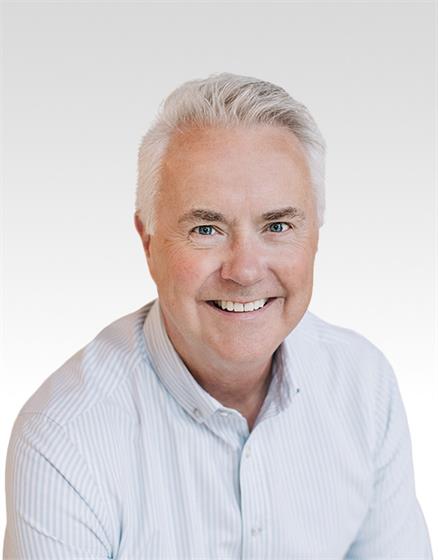
Michael Nelson
There is no more noble profession than that of an educator was what Michael Nelson’s mom said almost every day while he was growing up. For almost 40 years, Michael has been an educator. His mom would be pleased.
Even though Michael still considers “teacher” as his primary title, he has served in roles of principal, district instructional leader, superintendent, assistant executive director developing professional development for the state of Washington, and currently as the Thought Partner for the Instructional Leadership Collective.
Michael has received many state and national awards during his time as a principal and superintendent. As principal, his school received the National Blue Ribbon Award from the United States Department of Education. As a superintendent, he was named Washington state’s 2019 Superintendent of the Year. During his tenure as superintendent, Michael was elected President of the Washington Association of School Administrators (WASA) by his peers.
Michael Nelson co-facilitates coaching, keynotes, and workshops with Peter DeWitt. Their first book “Leading with Intention” was released in May 2024.
Related Titles
This is a carousel with related book cards. Use the previous and next buttons to navigate.
